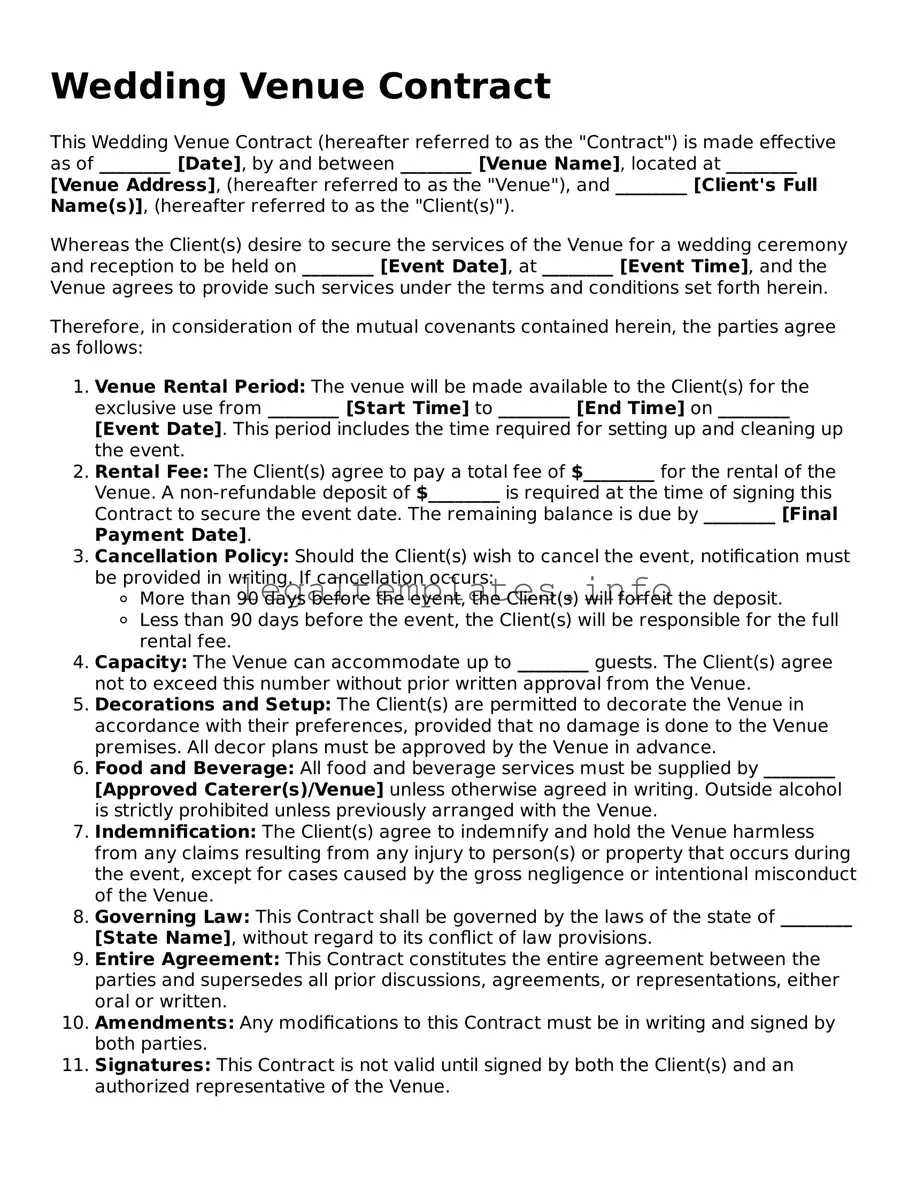What is a Wedding Venue Contract?
A Wedding Venue Contract is a legally binding agreement between the couple getting married and the owner or operator of the venue where the wedding will take place. This contract outlines the terms and conditions related to the use of the venue, including payment schedules, cancellation policies, and any specific requirements or provisions for the event.
Why is it important to have a Wedding Venue Contract?
Having a Wedding Venue Contract is crucial as it ensures both parties have a clear understanding of their rights and responsibilities. It provides a solid framework for what is expected, reducing the risk of misunderstandings or disputes. Furthermore, it offers legal protection should any issues arise before, during, or after the wedding.
What should be included in a Wedding Venue Contract?
A comprehensive Wedding Venue Contract should include details such as the date and time of the event, the total cost and payment schedule, a detailed list of services provided (e.g., catering, decoration, parking), policies on cancellation and refunds, insurance requirements, and any restrictions or rules of the venue (e.g., noise levels, alcohol consumption).
How can couples negotiate terms in the Wedding Venue Contract?
Couples can negotiate terms by thoroughly reviewing the contract and discussing any concerns or specific needs with the venue. It’s important to approach negotiations with a clear understanding of priorities, flexibility on certain aspects, and a willingness to compromise to reach a mutually beneficial agreement. Engaging a legal expert for advice or negotiations can also lead to more favorable terms.
What happens if the wedding needs to be cancelled or postponed?
The Wedding Venue Contract should outline specific terms regarding cancellation or postponement, including any deadlines by which decisions must be made, and the financial implications. Typically, the closer to the event date the cancellation occurs, the less likely a full refund will be available. Some venues may offer the option to reschedule, subject to availability. It’s essential to understand and negotiate these terms in advance.
Is a deposit required and how much?
Most wedding venues require a deposit to secure the date, which is often a percentage of the total cost. The exact amount can vary widely depending on the venue and its policies. The contract should specify the deposit amount, payment terms, and conditions for refundability. Understanding these details before signing the contract is critical.
What are the insurance requirements for a wedding venue?
Venues often require couples to obtain event insurance to cover potential damages, injuries, or unforeseen circumstances that might occur during the wedding. The contract should detail the types and amounts of insurance required. Couples should carefully review these requirements and consider their insurance options to ensure compliance and protection.
How are disputes resolved if they arise from the contract?
The contract should include a dispute resolution clause that outlines the process for resolving any disagreements between the couple and the venue. Common approaches include mediation or arbitration. Understanding the dispute resolution process is important for addressing any issues efficiently and amicably.
Can the Wedding Venue Contract be modified after it’s signed?
Modifications to the contract after signing are generally possible but must be agreed upon by both parties. Any changes should be documented in writing and formally added to the contract through an amendment. It’s vital to communicate any desired changes as soon as they arise and to ensure all amendments are recorded accurately to avoid future disputes.

